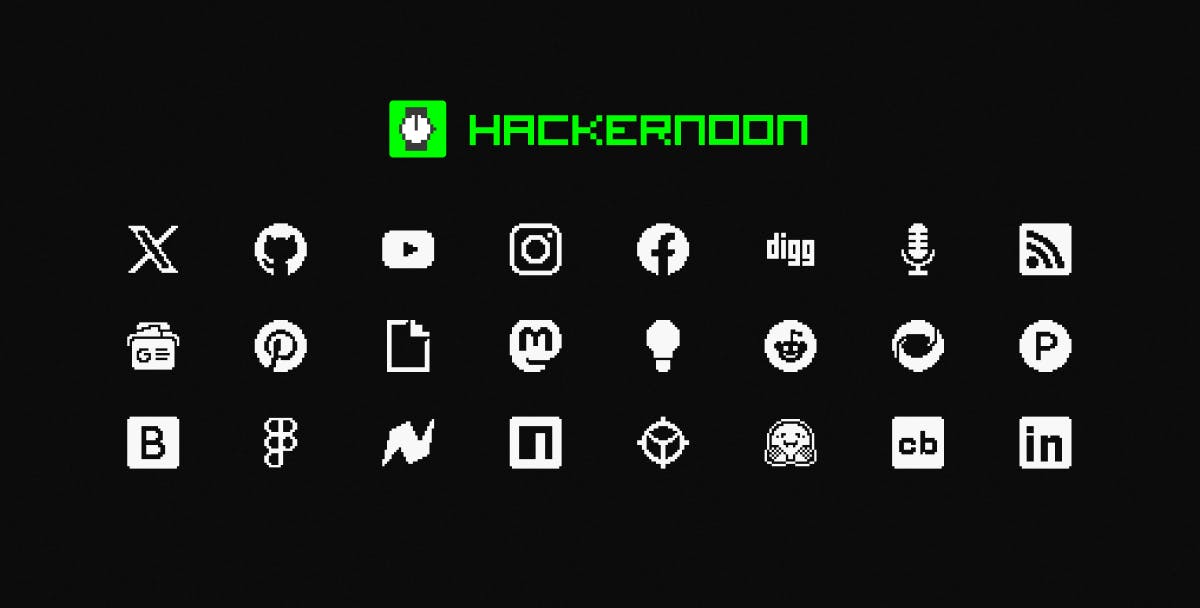I’ve spent a decade plus distributing technology content around the web. At HackerNoon, we’ve built a lot of automated systems and spend a lot of marginal labor to acquire readers around the web. As a founder, I find myself constantly thinking about what others may consider miniscule details, like what pixels and links belong in our footer. Pictured above are 24 social networks currently featured in the HackerNoon sitewide footer. Also note, each icon is pixelated and open sourced, please use them. Below, I’ve provided some brief context about why each network matters and a link to HackerNoon’s presence on the network.
Twitter / X
So much noise around this one, but it remains the most popular place in tech to make a public statement, and host to many of my favorite things said about HackerNoon. Their recent API and billing changes make no sense, developers have no clue how to build with it or how much it will cost, but when it comes to media’s impact, follow the money. Yes the valuation is down 71%, but the owner went from not the richest man to the richest man while choosing to spend much of his waking hours using and building this product. The power of this media to drive his other interests is remarkable.
GitHub
Code runs the world. Nothing says I’m a technology company like an active GitHub account. While GitHub is owned by Microsoft, it doesn’t stop Alphabet (Google), Meta (Facebook), Amazon, Apple, NVIDIA and the like from hosting their most popular open source repos here. That says about all you need to know about how ingrained GitHub is to code hosting and technology distribution. Contributing to open source starts with GitHub.
Youtube
Youtube is the second most popular search engine. Got to be listed, and encourage your community to talk about you here. The most popular search engine is its parent company. Competition FTW! Just kidding, social networks are more about competition amongst its users than competition amongst the networks imho. Even for a company specializing in text distribution like us, hosting and distributing video content (like Web 2.5!) on Youtube is essential for technology communities and businesses.
The first three covered the hosting of text, code and video, so lets circle back to the social media king of images. Instagram is the most important social network for branding. People, including HackerNoon writers, still love sharing their personal and professional wins here. Plus, it has additional network effects as Instagram’s shown a preference to reuse / cross pollinate your network via whatever app they come up with next, i.e. Threads.
While its average user seems to get older by the day, it indexes well in search, it still has 3B+ monthly users and (after Google/email) it remains the most popular solution to create an account on another app. Many Americans in tech overlook Facebook as a customer and reader acquisition channel, but don’t underestimate how Facebook continues to dominate social network activity around the world, especially in developing nations.
Digg
TBH, this one made my list due to nostalgia as much as performance. Digg was absolutely groundbreaking for proving that community curated news could effectively compete with corporation curated news. And I do think it’s worth splitting your social media efforts across the incumbent giants and smaller players. Our two namespaces (Blockchain & HackerNoon) list on their primary explore page, and it’s under new ownership, we’ll see how it evolves.
Podcast RSS Feed
Our podcast has gone through a number of iterations over the years, and imho everyone starting a podcast underestimates how much hard work goes into editing, distributing, scaling and running a quality podcast. But podcast RSS feeds get picked up by so many players and apps. At HackerNoon, we turn every text story into an audio file, redistribute those audio files by publishing the two top stories in each technology category daily to our owned 20+ podcast feeds.
Text RSS Feed
Long Live Really Simple Syndication!!! I DGAF that Google Reader is dead, a ton of the internet still relies on RSS. Plus, it has a compounding OG effect, as sites that get curated like Techmeme are the ones relying on RSS feeds. At HackerNoon, we have the main RSS feed, an RSS feed for every tech tag (example), an RSS feed for every contributing writer, and a bunch of custom RSS feeds built out for specific partners based on their formatting preferences.
Google News
Google News not only has hundreds of millions of monthly readers, but getting into Google News also means being curated in every product that uses Google News, such as new tab on Google Chrome, News tab on Google search, a bunch of places on Android phones, and a bunch of products building off the Google News API. The application process can be fickle, but they do wisely welcome niche publishers.
Thankfully, Pinterest embraces RSS, so the featured image on every HackerNoon story also automatically posts as a Pinterest post. Being in tech, we see less referral traffic from Pinterest than other industries and companies, like retail or Etsy for example. However, it is giving Google a run for its money when it comes to visual search performance. And as more of the HackerNoon community’s prompting AI generated images, it’s created a nice AI image art board there.
Giphy
Nothing says I work in tech like replying to your colleagues with GIFs. We’ve generated over one billion impressions via uploading original GIFs on Giphy. It’s fun, but what value is the impression? Facebook briefly bought it before selling it at loss to Shutterstock in order to appease regulators. In terms of the network growing long term, a social media company probably would have better executed growth than a stock photography company, but for now, it remains the most popular GIF host.
Mastodon
We haven’t really seen much traffic here, despite so many instances, it’s overall user count remains at only a couple million monthly actives. But I do love the underlying premise of content and subscriber portability that ActivityPub offers (what the Fediverse is built atop). So we think it’s a movement worth supporting, and will take a deeper look at how to integrate HackerNoon content into the Fediverse in 2024.
Minds
Minds, like HackerNoon rose up via equity crowdfunding, i.e. turning its community into shareholders. It’s positioning a social network with a business model separated from surveillance capitalism. After amassing tens of thousands of followers, we’ve seen levelling engagement, but are hopeful to keep growing here as the social network grows towards mainstream.
Honestly, Reddit is a enigma. It has true frontpage of the internet vibes, and yet, its hosts some of the most toxic comments on the whole internet. The pros and cons of anonymous usernames. Most discussion about HackerNoon there happens outside our subreddit, and founder Alexis Ohanian is a HackerNoon shareholder, so we’ll always monitor what’s going on in Reddit’s underbellies.
Golden
Wikipedia’s deleted HackerNoon multiple times. It’s a impressively useful product, and a politically run site imho. I see Golden as a promising web3 hedge against Wikipedia’s monopoly of the digital encyclopedia. By combining wallet identity with fact checking of structured and unstructured data, I hope its incentive structure can lead to the creation of a trusted business encyclopedia.
ProductHunt
Digital products, digital launches! Anyone making digital products has come across ProductHunt launch days. The integrations with its parent company, Angellist / WellFound make for a deeper immersion in the startup ecosystem. Additionally, ProductHunt smartly switched it’s user homepage from the product launch to the companies themselves, making it stickier for companies to launch many products and aggregate it’s total reviews.
Bloomberg
If you’re not listed on Bloomberg, are you a notable business? The Bloomberg empire, from Terminal to its owned media on down, powers much of the business and financial world’s content and data inputs. It’s certainly worth pursuing if they will list your company and leadership team. I’m hopefully this can help validate our brand as journalists and customers run background on my company.
Figma
Adobe. Design, in the browser. They started as a tool (that we use and love internally at HackerNoon), and what followed was an ecosystem. The failed acquisition by Adobe is a great sign for the design community because as an independent company with more emerging competitive tools by the day, I think Figma will wisely steer into the design community as a competitive moat to its market share of the design industry. We’ll be hosting more design resources here in 2024.
Newsbreak
Newsbreak is the top independent local and niche news aggregator. We’ve had 22M+ views from Newsbreak. Unlike other news aggregators, Newsbreak walks a better line of not just stealing the content and putting their own call to actions where ads and content are, and instead, encouraging users to actually read the content on the publishers’ respective websites.
npmjs
Developers have a love/hate relationship with Javacript, but the reason they all have an opinion about is because the modern web relies on it. Part of our strategy in building a publishing platform, is splitting out what we build to manage and grow HackerNoon, into its own pieces of publishing software that others can use. Our first couple NPM packages are custom image uploader, custom rich text editor and original pixel icon library.
ViewBlock
We backup our entire library on Arweave. This ensures that HackerNoon and its contributing writers will have Web3 backups for all their stories. Viewblock is a third party block viewer where the user can see the text content of all HackerNoon stories in the actual blockchain signatures. In the unlikely event that HackerNoon is not accessible in your region, you could simply visit this wallet address and start reading HackerNoon by clicking on any of the hashes.
HuggingFace
Say it with me, GitHub for AI, GitHub for AI, GitHub for AI. We’ve been experimenting with AI models hosted on HuggingFace. As a publisher of tens of thousands of AI blog posts, we plan to engage deeper with the AI community. HackerNoon’s releasing our first dataset there, the 7M+ most cited technology stories and blogs in 2022 and 2023 about the 3k+ most valuable tech companies, and later in the year, plan to host our own AI publishing model/s there.
Crunchbase
Crunchbase solved its former parent company’s need for a startup database. Now as the internet’s most used startup database, it’s a much bigger business than TechCrunch itself. Very inspirational stuff for HackerNoon, a technical blogging platform with a burgeoning tech company database. Its API populates many other sites and applications, so keeping your business information up to date here keeps your business information up to date across a lot of the web.
Linkedin, along with X, hosts the highest volume of positive quotes about HackerNoon. It’s a defacto professional network, and hundreds of contributing writers list their work on their LinkedIn profiles. As the internet increasing moves toward who wrote this as a measure for why I should trust or not trust it, LinkedIn’s emphasis on professional credentials, skills, and connections will continue to become more valuable. Additionally through LinkedIn publisher, collaborative articles, and AI assisted writing - post Microsoft acquisition it’s become a more prominent destination for hosting the professional status update.
Are there any social networks we are missing and should be investing in? Let me know in the comments. Here is the full list of social networks HackerNoon’s active-ish on, and as a reminder, each icon is pixelated and open sourced, please use them.

